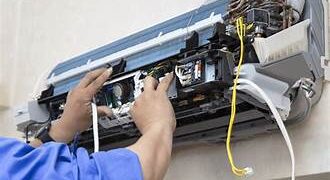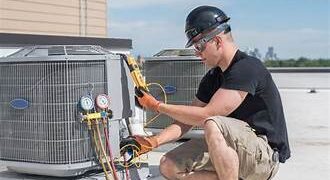Industrial HVAC maintenance is a crucial aspect of ensuring the smooth operation of complex systems in industrial settings. This comprehensive guide delves into the intricacies of maintaining industrial HVAC systems, highlighting the significance of regular upkeep and the dire consequences of neglect.
As we explore the components, scheduled inspections, common maintenance procedures, and best practices in this field, readers will gain valuable insights into maximizing the efficiency and lifespan of industrial HVAC systems.
Introduction to Industrial HVAC Maintenance
Industrial HVAC maintenance refers to the regular upkeep and servicing of heating, ventilation, and air conditioning systems in industrial settings such as factories, warehouses, and manufacturing plants.
Regular maintenance of industrial HVAC systems is crucial to ensure their efficient operation, longevity, and optimal performance. Neglecting maintenance can lead to a range of issues that can impact the comfort of occupants, the indoor air quality, and even the safety of the industrial environment.
The Importance of Regular Industrial HVAC Maintenance
Proper and timely maintenance of industrial HVAC systems is essential for various reasons:
- Ensures Efficient Operation: Regular maintenance helps prevent breakdowns and ensures that the HVAC system operates at peak efficiency, reducing energy consumption and operating costs.
- Improves Indoor Air Quality: Clean filters and well-maintained components help maintain good indoor air quality, promoting a healthy and productive work environment for employees.
- Extends Equipment Lifespan: Routine maintenance can help identify and address minor issues before they escalate, prolonging the lifespan of the HVAC equipment and reducing the need for costly repairs or replacements.
Potential Consequences of Neglecting Industrial HVAC Maintenance
Neglecting regular maintenance of industrial HVAC systems can lead to various negative consequences:
- Increased Energy Costs: Dirty filters, clogged ducts, and malfunctioning components can reduce the efficiency of the HVAC system, leading to higher energy consumption and increased utility bills.
- Reduced Comfort: Poorly maintained HVAC systems may struggle to maintain consistent temperatures, leading to discomfort for occupants and affecting productivity in the industrial environment.
- Health and Safety Risks: Neglected HVAC systems can contribute to poor indoor air quality, leading to respiratory issues, allergies, and other health concerns among employees. In extreme cases, it can even pose safety risks due to equipment malfunction or fire hazards.
Components of Industrial HVAC Systems
Industrial HVAC systems consist of various components that work together to maintain proper environmental conditions within industrial spaces. Regular maintenance of these components is crucial to ensure the efficient operation of the HVAC system and to prevent costly breakdowns. Below are some key components of industrial HVAC systems that require maintenance:
Air Filters
Air filters play a critical role in maintaining indoor air quality by trapping dust, dirt, and other particles. Regularly changing or cleaning air filters is essential to prevent clogs and ensure proper airflow.
Coils
Coils, including evaporator coils and condenser coils, are responsible for heat transfer in the HVAC system. Cleaning coils helps maintain efficiency by allowing for optimal heat exchange between the refrigerant and the air.
Fans
Fans circulate air throughout the HVAC system. Inspecting and lubricating fan motors, as well as cleaning fan blades, can help prevent overheating and ensure proper airflow.
Thermostats
Thermostats control the temperature settings of the HVAC system. Regular calibration and testing of thermostats are important to ensure accuracy and efficiency in maintaining desired temperature levels.
Ductwork
Ductwork distributes heated or cooled air throughout the industrial space. Inspecting ducts for leaks, damage, or blockages can help maintain proper airflow and prevent energy waste.
Refrigerant Levels
Refrigerant is crucial for the cooling process in HVAC systems. Checking and maintaining proper refrigerant levels can prevent system malfunctions and ensure efficient operation.
Electrical Components
Electrical components, such as wiring and connections, play a vital role in the operation of HVAC systems. Regular inspections and testing of electrical components can help prevent electrical issues and ensure safety.Regular maintenance tasks specific to each component, such as cleaning, lubricating, inspecting, and testing, are essential to ensure the longevity and efficiency of industrial HVAC systems.
Importance of Scheduled Inspections
Regular scheduled inspections play a crucial role in the maintenance of industrial HVAC systems. These inspections help in ensuring the efficient and effective operation of the system, as well as identifying any potential issues early on before they escalate into major problems.
Frequency of Inspections
Scheduled inspections should be conducted at least twice a year, ideally before the start of the cooling and heating seasons. Additionally, it is recommended to perform inspections after any significant maintenance or repair work on the HVAC system.
What Inspections Entail
During inspections, HVAC technicians will thoroughly examine all components of the system, including filters, coils, fans, motors, and ductwork. They will check for any signs of wear and tear, corrosion, leaks, or other issues that could affect the performance of the system.
Technicians will also test the system's controls and safety mechanisms to ensure they are functioning properly
.
Benefits of Regular Inspections
- Early detection of potential issues can prevent costly breakdowns and repairs.
- Improved energy efficiency and reduced utility costs by ensuring the system operates at peak performance.
- Extended lifespan of HVAC equipment through proactive maintenance and timely repairs.
- Enhanced indoor air quality and comfort for building occupants.
Common Maintenance Procedures
Regular maintenance procedures are crucial for ensuring the optimal performance and longevity of industrial HVAC systems. By conducting routine tasks such as filter replacement and coil cleaning, you can prevent breakdowns, improve energy efficiency, and maintain a comfortable indoor environment.
Filter Replacement
- Turn off the HVAC system to ensure safety.
- Locate the air filter compartment and remove the old filter.
- Check the size and type of the filter to ensure proper replacement.
- Insert the new filter, following the directional arrows for airflow.
- Secure the filter compartment and turn the system back on.
Coil Cleaning
- Turn off the power to the HVAC system.
- Remove any debris or obstructions from the coils.
- Apply a coil cleaning solution and let it sit for the recommended time.
- Rinse the coils thoroughly with water.
- Allow the coils to dry completely before turning the system back on.
These maintenance procedures play a crucial role in the overall efficiency of the HVAC system. A clean filter ensures proper airflow, preventing strain on the system and reducing energy consumption. Similarly, clean coils improve heat transfer, allowing the system to operate more effectively and efficiently.
By following these maintenance tasks regularly, you can extend the lifespan of your industrial HVAC system and avoid costly repairs in the future.
Best Practices for Industrial HVAC Maintenance
Maintaining industrial HVAC systems is crucial for optimal performance and energy efficiency. By following best practices for maintenance, you can avoid costly repairs, ensure the longevity of your equipment, and create a comfortable environment for occupants.
Regular Inspections and Cleaning
- Perform regular inspections of all components, including filters, coils, fans, and ductwork, to identify any issues early on.
- Clean or replace filters as needed to prevent airflow restrictions and maintain indoor air quality.
- Keep coils and fins clean to ensure efficient heat transfer and prevent system breakdowns.
Proactive Repairs and Replacements
- Address minor repairs promptly to prevent them from escalating into major issues.
- Replace worn-out or damaged parts before they cause system failures.
- Upgrade outdated components to improve system efficiency and performance.
Scheduled Maintenance Plan
- Develop a structured maintenance plan that includes regular inspections, cleaning, and servicing of all HVAC components.
- Follow manufacturer's recommendations for maintenance tasks and schedules to ensure warranty compliance.
- Document all maintenance activities and keep detailed records for reference and future planning.
Conclusion
In conclusion, industrial HVAC maintenance is not just a routine task but a strategic investment in the longevity and efficiency of crucial systems. By adhering to best practices and conducting regular inspections, businesses can mitigate risks and ensure optimal performance.
Stay proactive in your maintenance approach to reap the rewards of a well-maintained industrial HVAC system.
Questions Often Asked
How often should industrial HVAC systems undergo maintenance?
Industrial HVAC systems should ideally undergo maintenance at least twice a year to ensure optimal performance and longevity.
What are some common signs that indicate industrial HVAC systems require maintenance?
Common signs include reduced airflow, strange noises, foul odors, and inconsistent temperature control.
Is it necessary to hire professionals for industrial HVAC maintenance tasks?
While some maintenance tasks can be DIY, it's recommended to hire professionals for complex procedures to ensure safety and effectiveness.











